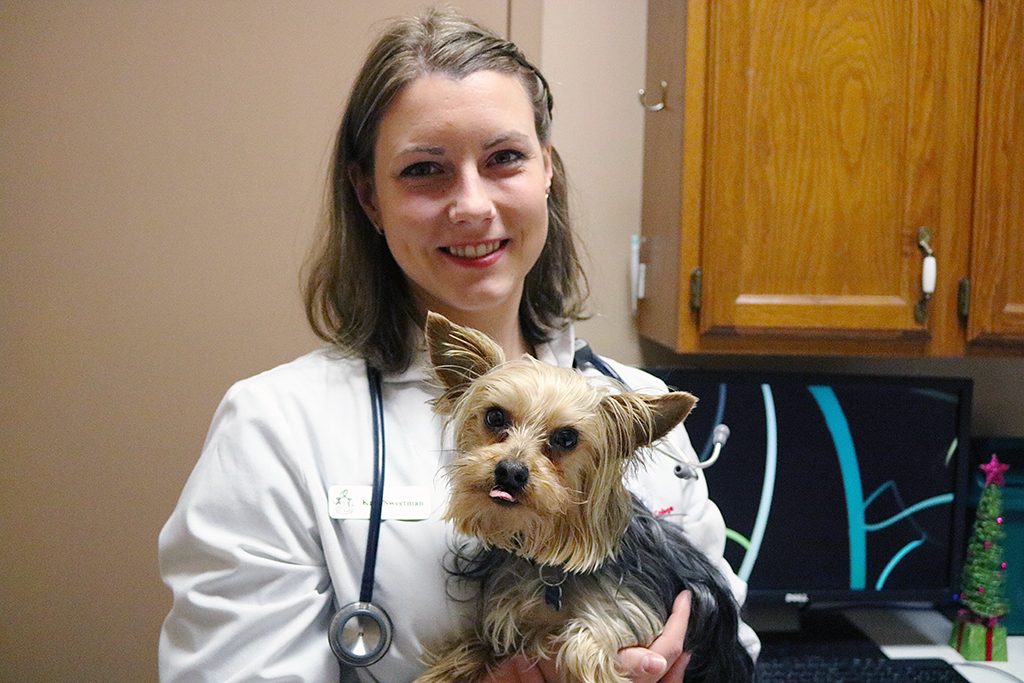Keeping you and your pets safe this holiday season

Dr. Kate Sweetman with her Yorkshire terrier, Hubert, at the Downtown Veterinary Hospital. (Photo by Ryan Percy)
By Ryan Percy
To keep the joy of the holiday season from turning to disaster, there is nothing more important than safety preparedness for your family and pets.
The holiday season is supposed to be filled with joy and happiness, but there is also the possibility of hazards that can do much more than ruin the mood. When it comes to you and your pets there are a number of precautions that you can take to make sure disaster does not fall upon your property.
Fires are some of the worst hazards that could be possible. This is compounded by the fact that homes become decked with flammable festive decorations. Jason Suchiu, 47, is the assistant deputy chief of the Lakeshore Fire Department and says that with Christmas festivities and celebrations starting earlier each year the danger gets worse.
“People end up getting trees that have been cut and are up for anywhere up to a month before the Christmas season comes,” said Suchiu. “Over that period of time, even if they are maintained, they dry out and that poses more of a risk.”
It is possible to keep a tree hydrated to make sure it would not burn as quickly. However, live trees essentially bringing pure fuel into your home even if they are kept wet. Suchiu warns that even the most protected tree will still burn more quickly than people expect. Even a hydrated tree when consumed in flames, ignites the space around it in 60 to 90 seconds.
Suchiu said that nothing is more important for fire preparedness than having a plan that you and your family rehearse throughout the year. He also gives a number of other changes a family can make to their decorations as further precautions.
“Having it so it’s still festive but not overloaded with combustible decorations, so that reduces the fuel load,” said Suchiu. “Make sure they are using newer LED style lighting because the lights will give off less heat. Also eliminate the use of extension cords that the lights are plugged into.”
It is not only the humans of the household that are at risk. Dr. Kate Sweetman of the Downtown Veterinary Hospital in Windsor said there are a number of complications that we can spring upon our pets based on what changes with the new season.
Changes in cooking habits can be harmful for pets. One of the worst culprits are onions, along with grapes and raisins. Onions are toxic to both cats and dogs. Sweetman suggests that if you come home and find your garbage spread around your kitchen then you should monitor your pets in case they ingested any kind of toxic produce you may have thrown away.
Certain plants that are brought into the house around Christmas time can also pose a problem. What humans might find beautiful, animals might find poisonous. While poinsettias are mildly toxic and may lead to vomiting or diarrhea in dogs and cats, Sweetman urges that one of the least realized hazards to pets is the pine tree itself.
“Sometimes your animal is really interested in your Christmas tree,” said Sweetman. “The pine needles, if they ingest them can cause irritation in their stomach. In some worse case scenarios the needles can become dry and sharp and perforate the intestines.”
During the holiday season the cold weather can cause hypothermia in both people and pets. Tropical and exotic pets should be kept in an environment they are accustomed to when it comes to temperature, humidity, and daylight cycle. Dogs and cats should still be looked after, especially if they transition between indoor and outdoor. Each pet is different and will likely make it known when they want to come in. Outdoor exclusive pets should have a shelter outside that is heated and not drafty so they are the most comfortable. If the animal is too cold, the best way to deal with hypothermia is the same way as with people.
“If you’re worried that your pet has been out there and potentially has frost bite on their toes, warm them up gradually,” said Sweetman. “Don’t put them in hot water, put them in lukewarm water or even holding them with your hands to slowly warm them up if you’re worried about frostbite. If you are worried they have been left outside in the snow after you warm them then you should seek veterinary help.”
With all of these points kept in mind, the holiday should be both joyous and safe for you, your family and your furry friends.


